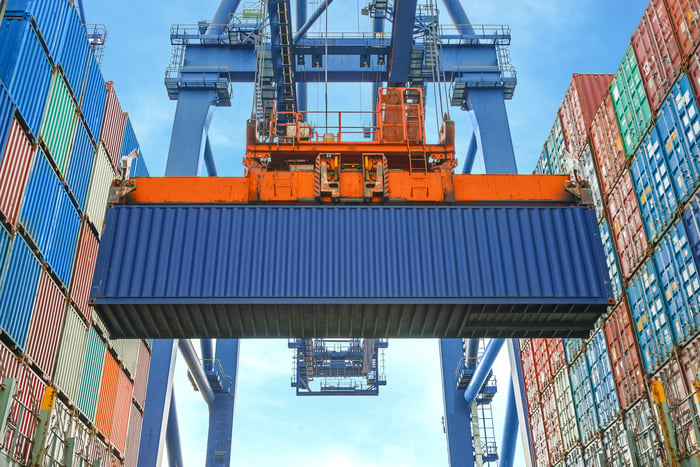Berkshire Hathaway (BRK.A -0.09%) (BRK.B -0.24%) CEO Warren Buffett is one of the greatest investors of our time. He's built up a net worth of more than $83 billion, and has created over $400 billion in value for his company's shareholders over five-plus decades.
His success over the years has created quite the following on Wall Street. This is to say that when Buffett makes a purchase or sells a stock, professional and retail investors are likely to ride his coattails into and out of a position.
Through the first two quarters of the wildest year on Wall Street, Buffett has been a net seller of equities. But that's not been the case for the Oracle of Omaha and his team during the third quarter. Although we don't have the exact figures -- we'll have more concrete numbers when Berkshire Hathaway files its 13F with the Securities and Exchange Commission (SEC) in mid-November -- we know for a fact that at least $18.5 billion of Berkshire Hathaway's $147 billion cash hoard has been put to work during the third quarter.

Berkshire Hathaway CEO Warren Buffett. Image source: The Motley Fool.
Berkshire acquires transmission and storage assets: $9.7 billion
The third quarter kicked off with a bang, as Buffett and his team dusted off their wallets and went shopping for the first time in about 4.5 years. For a total consideration of $9.7 billion, Berkshire Hathaway acquired more than 7,700 miles of natural gas transmission pipeline and 900 billion cubic feet of storage from Dominion Energy (D 1.05%). Approximately $4 billion is to buy the infrastructure, with Berkshire assuming $5.7 billion in debt tied to these assets.
Why make the deal? The simple answer is that Buffett is a big fan of assets that create consistent cash flow. Midstream natural gas companies should remain incredibly busy for decades to come as utilities switch away from coal and toward cleaner energy sources. It also doesn't hurt that Buffett was able to more than double Berkshire Hathaway Energy's share of interstate natural gas transmission to 18% from 8%.
The deal made sense for Dominion, too, which is wanting to focus on its electric utility assets. Dominion will be using the cash it receives from Berkshire to buy back its own stock, which should have a positive impact on earnings per share.

Image source: Getty Images.
Buffett stocks up on Bank of America: $2.1 billion
However, the Oracle of Omaha wasn't done in July. During a roughly two-week stretch at the end of July and the beginning of August, regulatory filings with the SEC show that Berkshire Hathaway acquired approximately $2.1 billion worth of shares in Bank of America (BAC 0.28%).
Typically, Buffett and his team won't hold a position of more than 10% in any bank stock. That's because a stake of greater than 10% could result in Berkshire Hathaway being classified a bank holding company (BHC). As a BHC, Berkshire could come under a host of strict regulations from the Federal Reserve, and Buffett would much rather avoid that headache.
Thankfully, the Federal Reserve Bank of Richmond gave Berkshire Hathaway the all-clear to increase its stake in Bank of America up to 24.9% without being classified as a BHC. Buffett has certainly taken that green light to heart, at least in the third quarter.
I suspect Buffett appreciates how interest sensitive Bank of America is relative to other big banks. Interest rates have nowhere to go but up from here, and the Oracle of Omaha has no issue waiting for results. BofA has also done an excellent job of controlling noninterest expenses through branch closures while promoting digital engagement.

Image source: Getty Images.
The Oracle of Omaha piles into Japanese trading firms: At least $6 billion
At the end of August, the investment community learned that Berkshire Hathaway had taken slightly over 5% stakes in Japan's five largest trading companies: Itochu, Marubeni, Mitsubishi, Mitsui, and Sumitomo. Based on the closing values of these five trading giants when the stakes were announced, it would equate to a $6.25 billion investment. For the sake of being conservative, I'm calling it "at least" a $6 billion investment.
These five trading companies are responsible for the import of critical supplies into Japan. They handle bringing food, metals, and other resources into the service-driven country, while also aiding in industrial development. Although margins for these trading companies can be pretty thin, their volume, international trade networks, and share of Japanese trade, are enormous.
For his part, Warren Buffett has pledged to hold these investments for the long-term, and to not exceed a 9.9% stake without the consent of a trading company's board of directors.
It's not entirely clear why Buffett took these stakes. It's possible that Buffett, a notorious value hawk, simply couldn't turn down the single-digit price-to-earnings ratios that some of these trading companies sport. This investment also happened right around the time Shinzo Abe announced he would be resigning as Japan's prime minister due to health reasons. Perhaps Buffett foresees corporate reforms in the Japan that could prove lucrative. If I were a betting man, my money is on the former.

Image source: Getty Images.
Buffett's team buys a red-hot Snowflake: $735 million
Finally, two weeks ago we learned that Berkshire Hathaway was buying a stake into red-hot cloud data warehousing company Snowflake (SNOW 1.38%). This private placement allowed Berkshire to acquire $250 million shares at the initial public offering list price (which was $120). The amended S-1 from Snowflake also notes that Buffett's company would acquire an additional 4,042,043 shares at the IPO list price from former CEO Bob Muglia in a secondary offering. In total, this works out to an investment value of about $735 million.
For those of you who believe that 90-year-old Warren Buffett has turned the corner on tech stock investments, think again. The paperwork of this deal was signed by Buffett's investment lieutenant Todd Combs, and I'd be willing to wager that Buffett has absolutely no clue what Snowflake even does. This purchase is 100% the work of Todd Combs and/or Ted Weschler.
Getting in at the list price could prove fruitful for Buffett's company. Of course, justifying a triple-digit sales multiple, even in the high-growth cloud space, isn't going to be easy.
Ultimately, a $735 million investment is a drop in the bucket for Berkshire. But it keeps with the recent theme that Buffett and his team are finally putting some of their cash hoard to work.





